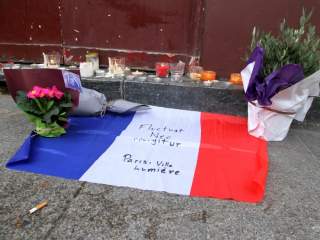10 Events That Changed the World in 2015
"You may want to read what follows closely. Several of these stories could continue to dominate the headlines in 2016."
3. Negotiations on Iran’s Nuclear Program Produce a Deal. If at first you don’t succeed, try, try again. That old saying could be the motto of the Iran nuclear negotiations. Conducted off and on since 2002, they finally produced a deal in July. Formally called the Joint Comprehensive Plan of Action (JCPOA), it wasn’t sealed until September, when forty-two Democratic senators voted to block a resolution to stop it. Neither the P5+1 nor Iran got all it wanted in the JCPOA. Iran got sanctions relief, but it had to agree to give up 97 percent of its stockpile of enriched uranium, slash its number of centrifuges by two-thirds, and shut down a heavy water reactor. Iran also had to agree to on-site inspections by the International Atomic Energy Agency. If Iran violates the JCPOA, sanctions can be re-imposed. To extract these concessions from Iran, the P5+1 agreed to let the deal’s critical provisions expire after ten or fifteen years. The White House says the deal will prevent Iran from acquiring a nuclear weapon for more than a decade and increase the “breakout time” should Tehran decide to acquire nuclear weapons. The deal’s critics, and there are many, both at home and abroad, say the deal failed to deliver the only acceptable outcome: dismantlement of Iran’s nuclear program.
2. ISIS Terrorists Strike on Three Continents. When President Obama told an interviewer on November 12 that “we have contained” the Islamic State, he had in mind its geographical ambitions in the Middle East. A day later, the world discovered that the Islamic State was taking its fight beyond its home territory. Three teams of ISIS terrorists struck at four locations in Paris, killing 130 people. But ISIS’s efforts to take the fight to its enemies had begun even earlier. In July, a suicide bomber loyal to the Islamic State killed thirty-three people in Suruc, Turkey, not far from the border with Syria. Three months later, two suicide bombers, one the brother of the Suruc bomber, killed 102 people at a peace rally in Ankara. On October 31, a bomb brought down a Russian passenger airliner over the Sinai, killing all 224 people on board. And then on December 2, a husband and wife who had pledged allegiance to the Islamic State’s caliph, Abu Bakr Al-Baghdadi, killed fourteen people in a mass shooting in San Bernardino, California. The attacks prompted renewed Western airstrikes against the Islamic State, redirected domestic politics in France and the United States, and raised ominous questions about what 2016 might bring.
1. Refugee Crisis Roils Europe. A decade ago experts were writing books with titles like Why Europe Will Run the 21st Century. In 2015, Europe hardly looked capable of handling its own problems, let alone run the world. Still struggling to emerge from a deep economic recession, it was hit by a wave of nearly a million refugees. Most were seeking to escape the horrors of the Syrian civil war or instability and violence elsewhere. Others, however, were economic migrants seeking better job opportunities. The influx of refugees provided heart-wrenching images of people desperate to reach Europe, sometimes failing with deadly consequences, but more often succeeding. The influx exposed Europe’s porous borders, highlighted differences within Europe over how to handle immigrants, and gave new life to Europe’s many nationalist and anti-immigrant parties. The refugee crisis also created political problems across the Atlantic. The Obama administration announced in September that it would take in “at least 10,000” Syrian refugees in 2016. But in the aftermath of the Paris and San Bernardino attacks, compassion quickly swung to concern, and federal, state, and local politicians moved to block Muslim refugees from entering the United States or relocating to their communities. As long as Syria’s civil war persists and European economy attracts job-seekers, the refugee and migrant pressure on Europe will continue.
Other stories of note in 2015 included President Obama’s decision to reverse course and keep U.S. combat troops in Afghanistan through the end of his presidency, ongoing peace negotiations in Colombia, escalating tensions in the West Bank and Jerusalem, the discovery of debris from Malaysia Airlines Flight 370 on Reunion Island, a collapsed crane in Mecca and a deadly stampede at the Hajj, China’s decisions to abandon a one-child policy in favor of a two-child policy, and the arrests (yes, there were more than one) of senior officials at FIFA, the organization that oversees soccer (or “football”) around the world.
So that’s my top ten world events of 2015. You may have a different list or you might put these events in a different order. If so, please use the comments below to let me know what you think.
James M. Lindsay is Senior Vice President, Director of Studies, and Maurice R. Greenberg Chair at the Council on Foreign Relations. This article originally appeared in The Water’s Edge.
Image: Wikimedia Commons/Maya-Anaïs Yataghène

